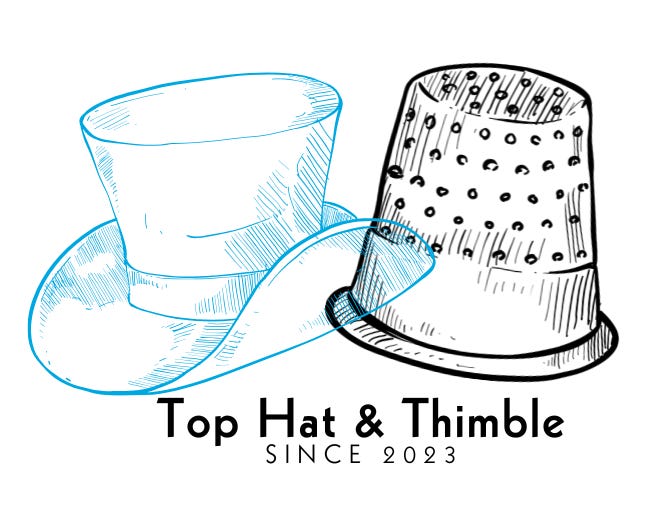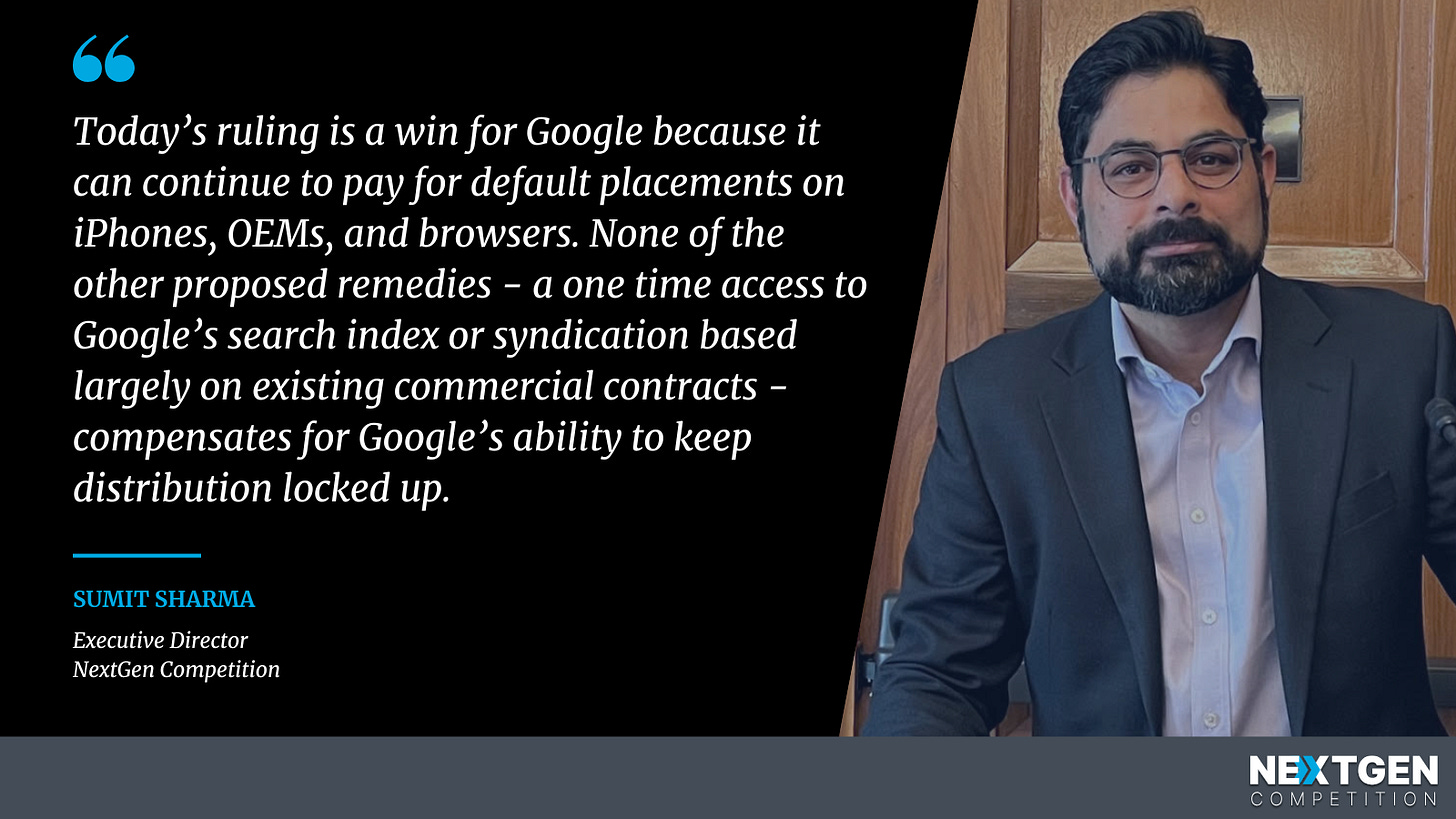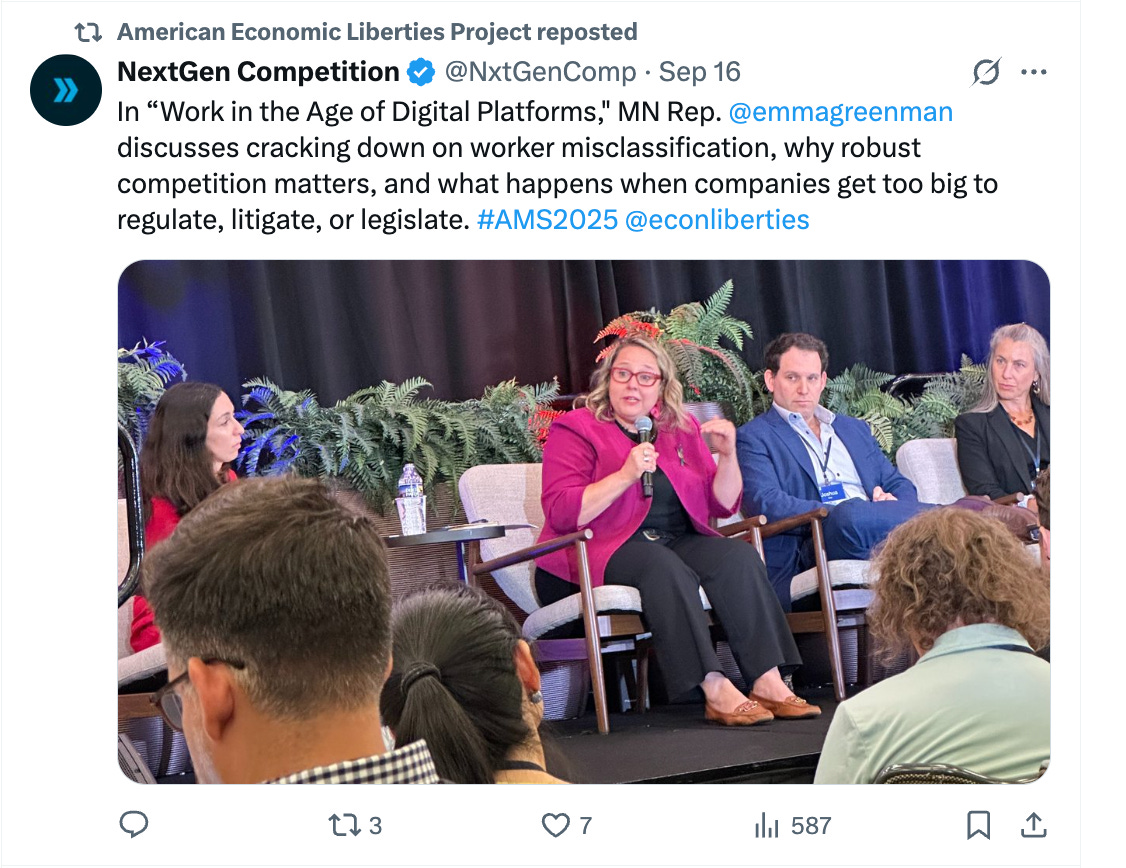Top Hat & Thimble - September 2025
Welcome to NextGen Competition’s monthly recap, delivering insider insights on antitrust battles, industry shakeups, AI trends, and more.
Both Google and Apple stocks rose following Judge Mehta’s decision on how to remedy Google’s monopoly in general search and general search text advertising. The headlines suggest that this is partly due to Google avoiding a break-up, but I never thought this was in the cards.
A more plausible reason is that the remedies ordered are insufficient because Google can continue to pay to be the default service on iPhones, carriers, OEMs, and browsers.
Judge Mehta mentions the prophylactic effect of the on-going search case on Google’s distribution contracts (page 111 of the liability decision). Well, the remedies decision has had the opposite effect – encouraging Google and Apple to further strengthen their cozy relationship by integrating Google’s Gemini into the iPhone.
This is a missed opportunity. An important path to a more competitive online ecosystem is for Apple and Google to compete vigorously with each other on all services. None of Judge Mehta’s remedies makes this a more likely outcome than before.
As a result, the tacit agreement between Apple and Google not to compete on certain services can continue. This is based on the tens of billions of dollars in yearly payment that Apple receives from Google for search - these can continue and be extended under the remedy decision.
A remedy that restricts all payments from Google to Apple for the distribution of any of Google’s products is what is required. This could play out in a number of different ways, all of which would result in better outcomes for consumers:
Apple could keep Google’s services as the default and get paid nothing. This will incentivize Apple to develop its own search engine and fast track its own AI products resulting in more competition, innovation, and benefits for consumers. Apple did this for mapping services, and consumers benefit from the competition between Apple Maps and Google Maps. It could have the added benefit of more competition in syndication if Apple chooses to license its search engine to others.
Apple could introduce choice screens for search engines, including Google search as one of the options as it has done in the EU. The auction mechanism will be more open and transparent than the tacit agreements between Apple and Google today, and, compared to the current situation, more users will try and potentially switch to one of Google’s competitors.
Apple could sign a default agreement with another search engine or AI assistant, providing a valuable distribution channel for one of Google’s competitors. This would help that competitor grow and introduce more competition in the market.
Note that Apple has over $100 billion in cash on hand, so while it might miss the easy, free monopoly money from Google, it will still have the ability to invest and the added incentive to innovate because it no longer has a tacit non-compete agreement with Google for certain services.
The DOJ and State AGs must appeal the decision to strengthen the remedies. Such an appeal could focus on further restrictions on Google’s ability to pay to be the default search or AI Assistant and ensuring Google offers better syndication terms than existing commercial terms – which is all that the remedies decision seems to require.
Thank you for reading and for your support.
With regards,
Sumit Sharma
Executive Director
NextGen Competition
More on Judge Mehta’s Google Search Remedies Ruling
As Sumit shared, Judge Mehta’s remedies in the Google search monopolization case fall short of opening up real competition. From our statement:
Microsoft Wants You to Pay—or Throw Away—Your Computer
NextGen Competition joined an open letter led by PIRG urging Microsoft not to “abandon hundreds of millions of computers” as it prepares to end ongoing support for Windows 10. Here’s why we’re joining many others in raising the alarm.
This is a looming security disaster for millions of users. Microsoft is no stranger to the dangers of how widespread the impacts could be from vulnerabilities discovered in its operating systems – remember last July’s global IT outage? Now the company is set to leave millions of devices exposed, swapping free updates for forced upgrades.
According to PIRG, after October 14, anyone who wants security updates must “pay or enroll in other Microsoft services.” For businesses, that starts at $61 per device and doubles each year for up to three years. Individuals get one year—if they pay a $30 fee. What if you want to upgrade to Windows 11 instead? Microsoft’s advice: “Consider purchasing a new PC.”
We’re watching this closely. It’s a clear example of how corporate concentration and an unwillingness to make a system inoperable creates a global risk.
Do you have one of these devices and are wondering what to do? Check out this guide from Consumer Reports.
NextGen at the 2025 Anti‑Monopoly Summit
Thank you to the American Economic Liberties Project for convening an extraordinary Anti‑Monopoly Summit. From lawmakers to labor leaders, the message was clear: concentrated corporate power threatens both our economy and our democracy. Conversations on Big Tech, AI, and competition policy underscored why this movement is gaining momentum across parties and industries.
In packed panels and breakout rooms, it became clear that advocates, entrepreneurs, and policymakers are ready to act. From Lina Khan’s keynote to grassroots organizers sharing frontline stories, the Summit reminded us what’s at stake — and what’s possible. Read more about the conference from AELP Executive Director Nidhi Hegde.
Other Competition News
Headlines from the past month you might have missed:
Lina’s Not Done: It’s been a busy month for Former FTC Chair Lina Khan, who’s been making the rounds on her antitrust crusade, even having to dodge rumors of a congressional run. In The New Statesmen, Freddie Hayward dives into Lina’s career and legacy, and the growing split in the Democratic party between what he calls the “abundantists” and the left populists. It’s a must read, and we especially loved this piece:
Khan’s theory is that these companies have squashed competition and acquired insurmountable market share by absorbing suppliers and competitors. In practice, this has meant that Amazon could own the predominant online marketplace and sell its products there. For years, Google blocked companies from selling adverts next to its search bar, even though it was a player in the very marketplace it controlled. Or consider the false choice that awaits you in supermarkets: a vast variety of brands, all owned by a few huge conglomerates, such as Unilever, Mars and Nestlé. Why is Boeing the only major aircraft manufacturer left in America?
Google’s Victory Lap: Amidst the disappointing outcome of the remedies ruling, Google seems to be flying higher than ever, achieving $3 trillion company status. You may be wondering, why did a monopolist of Google’s stature walk away with just a slap on the wrist? Former AAG for Antitrust Jonathan Kanter penned an op-ed in the New York Times addressing just that, calling it a “weak remedy,” “deflating,” and that it “fell short.” More importantly, he lamented the message it sent:
My disappointment is not just that Google was not properly held accountable, for the stakes extend beyond this particular case. If companies can flout the rules, reap trillions of dollars and face only modest constraints, the deterrent effect evaporates. The message to other companies is plain: It pays to break the law.
Mr. Showalter (Maybe) Goes to Washington: On the heels of last month’s AELP Anti-Monopoly Summit, David Dayen of The American Prospect profiled an alum of the DOJ Antitrust Division, FTC, and White House National Economic Council running for Congress in Illinois’ Seventh Congressional District. He discusses Showalter’s path to Congress, one paved by NH Rep. Maggie Goodlander, but notes it’ll be an uphill battle due to an influx of Big Tech cash and an “anointed successor.” 🏛️ Regardless, we especially love this quote from Showalter:
We are not free to make our own economic decisions, because there are people hundreds of miles away, whether traders on Wall Street or in C-suites or in the halls of Congress making those decisions,” Showalter said. “If we don’t find ways to expose people selling out the country, we don’t deserve the power.
Amazon’s Wrist Slap: The FTC settled their case with Amazon for $2.5 billion, what Former FTC Chair Lina Khan called a “drop in the bucket” for the tech giant. The case alleged Amazon misguided customers into Prime subscriptions and made the process of cancelling intentionally difficult. While FTC Chair Andrew Ferguson celebrated what he saw as a win for consumers, Khan wasn’t convinced:
This week marked the start of a historic jury trial, where American citizens would hear details of Amazon’s business practices and determine if it had broken the law. A couple of days into trial, FTC announces it has settled all charges, rescuing Amazon from likely being found liable for having violated the law and allowing it to pay its way out.
White House Ballroom, Brought to You By YouTube: In The Atlantic, Charlie Warzel laments what he calls the era of “Big Tech capitulation,” citing the $24.5 million settlement YouTube paid to Trump last week, which the majority of which is going to the Trust for the National Mall, which, you guessed it, is raising money for the previously announced White House ballroom. Warzel goes on to demonstrate the “embarrassing” downward spiral for tech giants, who are a far cry from where they were just several years ago. ⏳
In her best-selling memoir this year, the former Facebook employee Sarah Wynn-Williams wrote of the company’s executives that “the more power they grasp, the less responsible they become.” These words are also as good an epigraph for the Trump era as any. Rereading them in light of Big Tech’s full capitulation to the current administration makes clear that, although these about-faces are politically convenient, they reflect a broader harmony between the tech platforms and the MAGA movement.
While we’re on the topic of Big Tech flattery, President Trump hosted a dinner at the White House earlier in the month for over thirty tech leaders, including Sam Altman, Mark Zuckerberg, and Tim Cook. The President got billions of dollars in investment commitments, and Big Tech checked off another box on their “capitulation”checklist. Notably absent from the gathering? Elon Musk. 😬
Silicon Valley’s Faustian Bargain: In a searing essay for Wired, journalist Steven Levy traces how once-idealistic tech giants have lined up to kiss the ring of Donald Trump, abandoning civic values for regulatory favor. As tech titans like Mark Zuckerberg, Sam Altman, and Tim Cook cozy up to the administration, longtime insiders warn this transactional alignment threatens not only democracy, but tech’s own future. 😵💫
Data Center Damage: While Climate Week unfolded in New York, OpenAI’s Sam Altman was across the country, expanding his company’s already-massive data center footprint in Texas, part of Silicon Valley’s accelerating race to dominate AI infrastructure. But as The Free Press’s Jenna Ruddock reports, this growth comes with enormous environmental costs: staggering water use, rising utility bills, new fossil-fueled power plants, and communities kept in the dark until it’s too late. Her media call to action is especially poignant:
As more journalists and outlets take up this story — and we desperately need more reporters and newsrooms on the beat — keeping the bigger picture in frame becomes increasingly critical. It’s too easy to frame the rapid buildout of this infrastructure as an investment in our collective future. After all, a data center is making it possible for you to read this piece.
But this unprecedented explosion in data-center construction is an investment in one specific vision for the future — one that entrenches the power of dominant technology companies and enriches only those, like Sam Altman, who are at their helm.
Until next month! In the meantime, follow us on X, BlueSky, and subscribe to our Substackfor the latest on Big Tech, AI, and antitrust.




